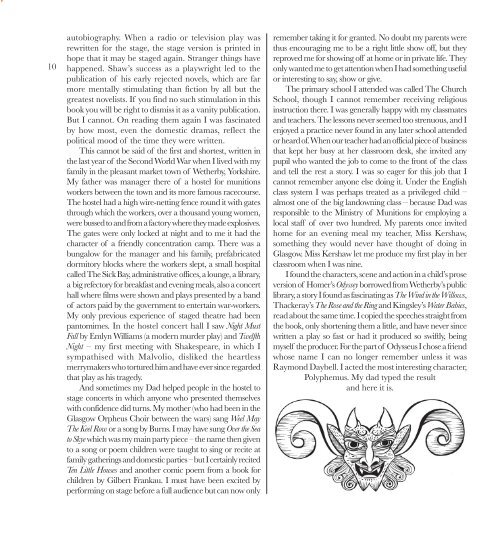A Gray Play Book by Alasdair Gray sampler
Long and short plays for stage, radio and television, acted between 1956 & 2009, an unperformed opera libretto, excerpts from The Lanark Storyboard and full film script of the novel Poor Things by Alasdair Gray.
Long and short plays for stage, radio and television, acted between 1956 & 2009, an unperformed opera libretto, excerpts from The Lanark Storyboard and full film script of the novel Poor Things by Alasdair Gray.
You also want an ePaper? Increase the reach of your titles
YUMPU automatically turns print PDFs into web optimized ePapers that Google loves.
10<br />
autobiography. When a radio or television play was<br />
rewritten for the stage, the stage version is printed in<br />
hope that it may be staged again. Stranger things have<br />
happened. Shaw’s success as a playwright led to the<br />
publication of his early rejected novels, which are far<br />
more mentally stimulating than fiction <strong>by</strong> all but the<br />
greatest novelists. If you find no such stimulation in this<br />
book you will be right to dismiss it as a vanity publication.<br />
But I cannot. On reading them again I was fascinated<br />
<strong>by</strong> how most, even the domestic dramas, reflect the<br />
political mood of the time they were written.<br />
This cannot be said of the first and shortest, written in<br />
the last year of the Second World War when I lived with my<br />
family in the pleasant market town of Wether<strong>by</strong>, Yorkshire.<br />
My father was manager there of a hostel for munitions<br />
workers between the town and its more famous racecourse.<br />
The hostel had a high wire-netting fence round it with gates<br />
through which the workers, over a thousand young women,<br />
were bussed to and from a factory where they made explosives.<br />
The gates were only locked at night and to me it had the<br />
character of a friendly concentration camp. There was a<br />
bungalow for the manager and his family, prefabricated<br />
dormitory blocks where the workers slept, a small hospital<br />
called The Sick Bay, administrative offices, a lounge, a library,<br />
a big refectory for breakfast and evening meals, also a concert<br />
hall where films were shown and plays presented <strong>by</strong> a band<br />
of actors paid <strong>by</strong> the government to entertain war-workers.<br />
My only previous experience of staged theatre had been<br />
pantomimes. In the hostel concert hall I saw Night Must<br />
Fall <strong>by</strong> Emlyn Williams (a modern murder play) and Twelfth<br />
Night – my first meeting with Shakespeare, in which I<br />
sympathised with Malvolio, disliked the heartless<br />
merrymakers who tortured him and have ever since regarded<br />
that play as his tragedy.<br />
And sometimes my Dad helped people in the hostel to<br />
stage concerts in which anyone who presented themselves<br />
with confidence did turns. My mother (who had been in the<br />
Glasgow Orpheus Choir between the wars) sang Weel May<br />
The Keel Row or a song <strong>by</strong> Burns. I may have sung Over the Sea<br />
to Skye which was my main party piece – the name then given<br />
to a song or poem children were taught to sing or recite at<br />
family gatherings and domestic parties – but I certainly recited<br />
Ten Little Houses and another comic poem from a book for<br />
children <strong>by</strong> Gilbert Frankau. I must have been excited <strong>by</strong><br />
performing on stage before a full audience but can now only<br />
remember taking it for granted. No doubt my parents were<br />
thus encouraging me to be a right little show off, but they<br />
reproved me for showing off at home or in private life. They<br />
only wanted me to get attention when I had something useful<br />
or interesting to say, show or give.<br />
The primary school I attended was called The Church<br />
School, though I cannot remember receiving religious<br />
instruction there. I was generally happy with my classmates<br />
and teachers. The lessons never seemed too strenuous, and I<br />
enjoyed a practice never found in any later school attended<br />
or heard of. When our teacher had an official piece of business<br />
that kept her busy at her classroom desk, she invited any<br />
pupil who wanted the job to come to the front of the class<br />
and tell the rest a story. I was so eager for this job that I<br />
cannot remember anyone else doing it. Under the English<br />
class system I was perhaps treated as a privileged child –<br />
almost one of the big landowning class – because Dad was<br />
responsible to the Ministry of Munitions for employing a<br />
local staff of over two hundred. My parents once invited<br />
home for an evening meal my teacher, Miss Kershaw,<br />
something they would never have thought of doing in<br />
Glasgow. Miss Kershaw let me produce my first play in her<br />
classroom when I was nine.<br />
I found the characters, scene and action in a child’s prose<br />
version of Homer’s Odyssey borrowed from Wether<strong>by</strong>’s public<br />
library, a story I found as fascinating as The Wind in the Willows,<br />
Thackeray’s The Rose and the Ring and Kingsley’s Water Babies,<br />
read about the same time. I copied the speeches straight from<br />
the book, only shortening them a little, and have never since<br />
written a play so fast or had it produced so swiftly, being<br />
myself the producer. For the part of Odysseus I chose a friend<br />
whose name I can no longer remember unless it was<br />
Raymond Daybell. I acted the most interesting character,<br />
Polyphemus. My dad typed the result<br />
and here it is.


















